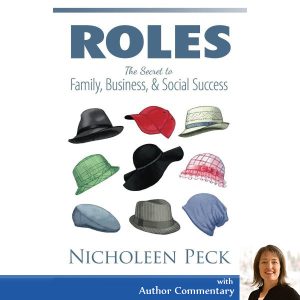Two Ways To Guide Youth Toward Purposeful Living
An exasperated mother said to me, “My teenager doesn’t like to work hard. She expects everything in life to be easy. How do I teach her to like work?”
“Do you like work?” I asked the mother. “Most people who don’t see value in work, or don’t like work, are taught somewhere along the way that work is bad or leads to bondage instead of to freedom and feelings of self-confidence and purpose. It’s always a good idea to examine a child’s culture to see where positive or negative messages might be coming from. Sometimes a solution to an attitude problem is easier than you might think because a parent can adjust an attitude and culturally solve the paradigm problem for the child,” I explained.
But, what about bigger problems? Family cultures that teach what is right, wrong, good, bad, and true or false, don’t only have the power to change attitudes about work; family communication and bonding traditions also offer vital lessons about deep things the child is looking for, like the real meaning of life.
Parents always ask me how to help their children understand the concept of living a life of purpose. Many of these parents are attempting to help their children break out of the usual techno-passive culture that children find themselves in, which leads to unfulfilled, unhappy living based off of pleasure-seeking and time-wasting. In order to achieve beyond the ordinary, socially passive expectations, youth need to know more about the various pathways to meaning and which pathways lead to peace, purpose, power, and happiness. Parents are the best people to teach children about finding the pathway that will help their child accomplish the big picture of the child’s life. Two of the most effective teaching methods for instilling life’s purpose are teaching by example and initiating open discussion.
Teaching By Example
My son, Porter, is currently serving a mission for our church. To go on this purpose-driven mission at age 18, my son gave up the once in a lifetime opportunity to play soccer on tour in the United Kingdom against clubs there and to learn from professional footballers. Why would he give this up? Why would he think that passing up on that pleasure-filled dream would be in his best interest?
Porter’s grandfather, my dad, also served a mission for our church at a young age. And, his grandpa had been given a scholarship to play soccer at Stanford University if he chose not to go on his church mission. His grandpa told all of his children and grandchildren how his duty to serve God and live his purpose for God was much more important than free money, sport, or prestige as part of the Stanford soccer team. Additionally, Porter’s father, brother, and sister also all served missions for our church at similar ages, and Porter has seen me serve families all over the world living my life’s mission as I try to help hearts turn back toward families during these times when hearts are turned myopically toward self and families are torn apart by civil (in family) wars.
Since Porter’s loved ones created a culture of service to God, it was natural for Porter to make his biggest life sacrifice up until this point and serve God, instead of himself, too.
Openly Discuss North Stars With Youth
Teach the children that they have many choices for their true north by discussing more in depth about life and purpose.
In the northern hemisphere, Polaris, the North Star, has historically led travelers because it maintains its location above the north pole and is a reliable and constant guide to the north. When north is determined, then all other directions are also made clear. This is very symbolic.
Just as mariners follow the North Star as they orient their actions, each person also makes decisions and sets priorities based upon their own personal north stars. Personal north stars are able to either unite or divide relationships. Common personal north stars that divide include pleasure, power, convenience, comfort, competition, being a victim, and ego. For instance, if a person is only following the pathway to pleasure, then they won’t want to engage in any activity with others if they don’t consider it pleasurable. And, if a person has victim as their north star, then they will constantly look for excuses for their mistakes and not want to take personal responsibility for their problems.
Even though pleasure, power, and comfort feel good for a moment, they don’t last indefinitely or offer real meaning in life. The north star called true purpose is the only guiding force that has the ability to guide generations of people to increased freedom and long-lasting joy. This is why so many parents work so hard helping their children understand and work toward purposeful living.
Webster’s 1828 dictionary defines purpose in this way, “Intention; design…purpose always includes the end view…with previous design…Being predestinated according to the purpose of him who worketh all things after the counsel of his own will. Eph 1.”
Purpose suggests that a person lives their purpose when they align their life path with what God has predestined them to accomplish. Knowing and living real purpose, instead of just ego-driven, pleasure-seeking counterfeits of purpose, happens when a person has an allegiance to God/goodness.
Allegiance to God/goodness is full of duty, hard work, and sacrifice, but it also enriches a life with meaning. By contrast, the other allegiances, self, others, and evil, might also involve hard work and sacrifice, but because they don’t fit the real definition of purpose or involve a greater power and greater plan for our lives, then they lead us to more cravings for meaning and more feelings of emptiness.
Choose Carefully
Choose meaning/allegiance/purpose carefully for yourself, because your children are choosing too, and they will follow your cultural example. And, don’t be afraid to change behaviors within yourself that could be misleading as well as have open, intentional discussions about the north stars that they can choose from as they plan their lives. Living with purpose is generational. People with good public virtue and honorable private virtue know that there are other north stars that they could follow, but they choose to look to goodness and real purpose because they’ve seen the peace and meaning that comes to people, often family members, who’ve mentored them and who live lives of purpose, too.
Strong relationships invite children to listen to their parents. The Teaching Self-Government parenting principles can help teach purpose and strengthen relationships for your family.
Index
- Adult Children, Adults, Age, Assertive Communication, Changing Hearts, Character Building, Common Vision Creation, Culture, Encouragement, Expectations, Family Culture, Family Unity, Four Basic Skills, Grandparents, Mission, Pre-Teach, Problem Solving, Relationships, Seek to Understand, Skills, Structure, Teens (Youth), Toddlers & Younger Children, Tone, Tweens, Unity, Vision, Work Ethic





